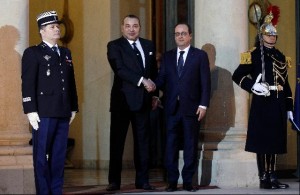Forbes
Ilan Berman, Contributor
The summit on countering violent extremism convened by the Obama administration last month was a lavish affair, full of pomp and circumstance and awash in foreign dignitaries. But substantive strategies for combatting radical ideologies, particularly those of Islamist groups, were far less in evidence.
That’s surprising, given the efforts that some of America’s most stalwart allies in the Muslim world are making in this fight. In this regard, none are more notable than the Kingdom of Morocco, which has erected a formidable “soft-power” strategy against Islamic radicalism over the past decade.
That strategy is grounded in religious legitimacy. Morocco’s monarch, Mohammed VI, is one of only a handful of Middle Eastern rulers who can trace his lineage back to the Prophet Mohammed. This ancestry gives Morocco’s king unparalleled credibility in the Islamic world.
Over the past decade-and-a-half, he has used this imprimatur to profound effect. Through a sweeping overhaul of the moudawana, the nation’s family code, his government has elevated the status of women in Moroccan society. It has promoted reconciliation with – and reintegration of – Morocco’s previously oppressed political dissidents. And, perhaps most profoundly, the Kingdom has championed a decidedly moderate interpretation of the Islamic faith.
It has done so through the work of the Rabita Mohammadia of Ulamas, a royally appointed council of religious scholars tasked with shaping Moroccan religious identity. The Rabita fulfills this task by debunking extremist interpretations of the Quran, by overseeing the training of religious scholars (including female clerics, known as morchadates), and by promoting ideas and values that help inoculate the population against the narrative of radical groups like the Islamic State.
Increasingly, it is beginning to help others do so as well. Over the past two years, the Kingdom has taken on a growing role in African religious affairs. As of mid-2014, eight separate countries in North and West Africa had formally requestedassistance from Morocco on religious education and training. The list includes Mali, 500 of whose imams are now being taught in Moroccan religious institutions pursuant to a 2013 agreement between Rabat and Bamako. It also encompasses Nigeria, which last year asked Morocco for assistance on religious issues as part of its efforts to combat the appeal of the Islamist group Boko Haram.
Contacts are growing with Cairo as well. Since taking power in mid-2013, the government of General Abdel Fatah al-Sisi has launched an all-out offensive against Islamist forces in Egypt, from the country’s powerful Muslim Brotherhood to terror cells in the Sinai Peninsula. As part of this process, Sisi has sought to break the Brotherhood’s monopoly on religious interpretation, spurring significant – if still quiet – contacts with Morocco on religious issues.
Even European nations are starting to take notice. In early February, France formally ended a nasty year-long diplomatic spat with Morocco when President Francois Hollande met in Paris with King Mohammed VI. The move was prudent – and strategic. As part of their discussions, the two leaders pledged to expand their cooperation on counterterrorism issues, a topic with which France has been grappling in earnest since the attack on the offices of the Charlie Hebdo magazine in January. Clearly, the Quai d’Orsay believes that Morocco can help in this regard.
French President Francois Hollande and King Mohammed VI of Morocco in Paris. The two leaders met in order to strengthen the relationship between their two countries, following a row over a French investigation into the Moroccan intelligence services. (Photo by Chesnot/Getty Images)
It’s a trendline worth noting within the Washington Beltway as well. Over the past year, the rise of the Islamic State and its strategic advances in both Iraq and Syria has refocused the attention of American policymakers on the struggle against radical Islam. But the U.S. approach is still long on rhetoric and short on real strategy.
Washington would do well to look to allies like Morocco, who are already fighting this fight in earnest. It would do even better to learn from them about how best to do so.








